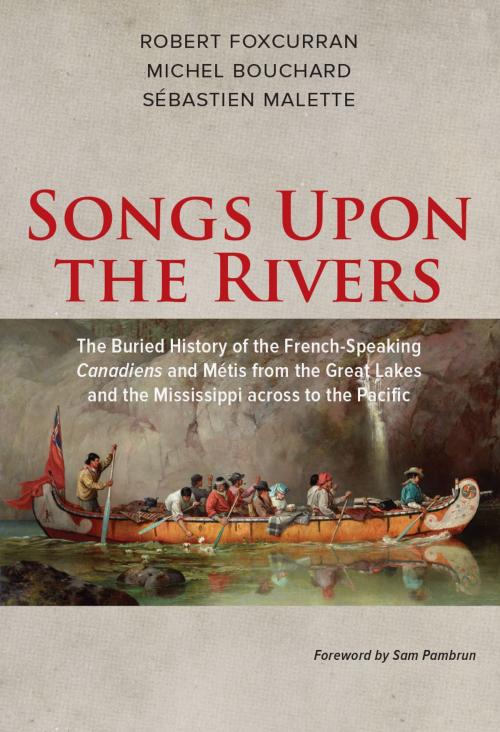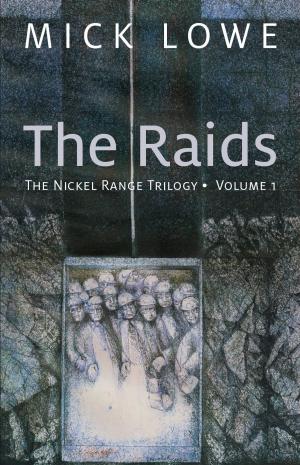Songs Upon the Rivers
The Buried History of the French-Speaking Canadiens and Métis from the Great Lakes and the Mississippi across to the Pacific
Nonfiction, History, Americas, North America, Canada, Native American| Author: | Robert Foxcurran, Michel Bouchard, Sébastien Malette | ISBN: | 9781771860925 |
| Publisher: | Baraka Books | Publication: | October 5, 2016 |
| Imprint: | Baraka Books | Language: | English |
| Author: | Robert Foxcurran, Michel Bouchard, Sébastien Malette |
| ISBN: | 9781771860925 |
| Publisher: | Baraka Books |
| Publication: | October 5, 2016 |
| Imprint: | Baraka Books |
| Language: | English |
Long before the Davie Crockets, the Daniel Boones and Jim Bridgers, the French had pushed far west and north establishing trade and kin networks across the continent. They founded settlements that would become great cities such as Detroit, Saint Louis, and New Orleans, but their history has been largely buried or relegated to local lore or confined to Quebec. Foxcurran, Bouchard, and Malette scrutinize primary sources and uncover the alliances, organic links and métissage, or mixing, between early French settlers and voyageurs and the indigenous nations. It began with the founding of New France by Samuel de Champlain in the early 1600s and continued well into the 19th century long after France was no longer a force in North America. The authors have combined keen and accessible story telling with vintage maps, forgotten documents (such as the little known writings of Alexis de Tocqueville), and old photos or paintings. What they have discovered and now recount will propel the story of the peoples engendered—and still thriving—, their French lingua franca, and their ways of life back into the heart of the narrative of North American history where they belong. Alexandre Guerrette dit Dumont. Born 1815 at La baye verte (Green Bay), Wisconsin, Dumont was one of the earliest settlers in Oregon's Umpqua region. Alexandre Guerrette dit Dumont. Born 1815 at La Baye verte (Green Bay), Wisconsin, Dumont was one of the earliest settlers in Oregon’s Umpqua region. Songs Upon the Rivers also challenges historical orthodoxies. The French-speaking Canadien and Métis, who descended from the French and indigenous nations, developed a hybrid culture invigorated by their close kinship ties with the indigenous peoples across the continent. Yet they kept their French songs and language, which effectively made French the lingua franca of the American and Canadian West well into the 19th century.
Long before the Davie Crockets, the Daniel Boones and Jim Bridgers, the French had pushed far west and north establishing trade and kin networks across the continent. They founded settlements that would become great cities such as Detroit, Saint Louis, and New Orleans, but their history has been largely buried or relegated to local lore or confined to Quebec. Foxcurran, Bouchard, and Malette scrutinize primary sources and uncover the alliances, organic links and métissage, or mixing, between early French settlers and voyageurs and the indigenous nations. It began with the founding of New France by Samuel de Champlain in the early 1600s and continued well into the 19th century long after France was no longer a force in North America. The authors have combined keen and accessible story telling with vintage maps, forgotten documents (such as the little known writings of Alexis de Tocqueville), and old photos or paintings. What they have discovered and now recount will propel the story of the peoples engendered—and still thriving—, their French lingua franca, and their ways of life back into the heart of the narrative of North American history where they belong. Alexandre Guerrette dit Dumont. Born 1815 at La baye verte (Green Bay), Wisconsin, Dumont was one of the earliest settlers in Oregon's Umpqua region. Alexandre Guerrette dit Dumont. Born 1815 at La Baye verte (Green Bay), Wisconsin, Dumont was one of the earliest settlers in Oregon’s Umpqua region. Songs Upon the Rivers also challenges historical orthodoxies. The French-speaking Canadien and Métis, who descended from the French and indigenous nations, developed a hybrid culture invigorated by their close kinship ties with the indigenous peoples across the continent. Yet they kept their French songs and language, which effectively made French the lingua franca of the American and Canadian West well into the 19th century.















